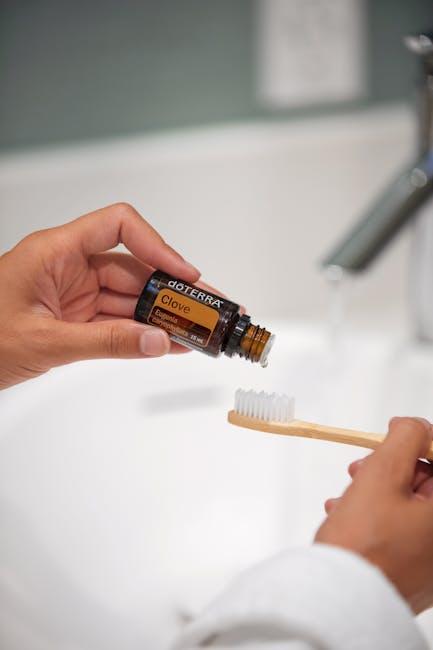In the hustle and bustle of our daily lives, oral health often takes a backseat, only grabbing our attention when discomfort strikes. Whether it’s a nagging toothache or inflamed gums, the pain can be both distressing and disruptive. Fortunately, nature has provided us with an age-old remedy that is both accessible and effective—clove. Known for its potent medicinal properties, clove has been used for centuries as a natural analgesic and antiseptic. In this article, we will explore how you can harness the power of clove to alleviate oral pain and promote overall dental health. With empathetic guidance, we’ll walk you through simple, practical steps to incorporate this aromatic spice into your oral care routine, offering relief and peace of mind in the process.
Understanding the Healing Properties of Clove for Oral Health
Clove, a small yet powerful spice, has been cherished for centuries for its remarkable healing properties, particularly in oral health. Rich in eugenol, a natural anesthetic and antiseptic, clove offers an array of benefits for maintaining a healthy mouth. Understanding how to harness these benefits can transform your oral care routine and provide much-needed relief from discomfort.
- Pain Relief: Clove’s eugenol acts as a natural anesthetic, providing immediate relief from toothaches. Simply apply a small amount of clove oil on a cotton ball and place it on the affected area.
- Antibacterial Properties: Clove is effective in fighting bacteria that cause oral infections. Rinsing with clove-infused water can help reduce bacterial growth and freshen breath.
- Anti-inflammatory Effects: Clove helps in reducing inflammation and swelling in the gums, making it beneficial for those suffering from gingivitis or periodontitis.
| Method | Benefits |
|---|---|
| Clove Oil Application | Instant pain relief, reduced swelling |
| Clove Water Rinse | Freshens breath, fights bacteria |
| Clove Paste | Soothes gums, reduces irritation |
Integrating clove into your daily oral care regimen can be simple and highly effective. Whether using clove oil directly on a troubled tooth or incorporating clove water as a mouth rinse, this spice offers natural and holistic support for a healthier smile.

Practical Steps to Incorporate Clove into Your Daily Oral Care Routine
- Clove Oil Rinse: Start by creating a simple mouth rinse. Mix a few drops of clove essential oil with a glass of warm water. Swish the mixture around your mouth for about 30 seconds to a minute. This rinse can help reduce inflammation and kill bacteria, promoting overall oral health.
- DIY Clove Toothpaste: Enhance your toothpaste by adding a pinch of ground cloves. Combine it with baking soda and coconut oil for a natural, antibacterial toothpaste. Use this mixture to brush your teeth as usual, enjoying the refreshing and pain-relieving benefits of clove.
- Clove Powder for Gum Massage: If you’re dealing with gum pain or sensitivity, gently massaging your gums with clove powder can provide relief. Take a small amount of clove powder on your fingertip and softly rub it onto your gums. This can help soothe discomfort and promote healthy gum tissue.
For a quick reference on incorporating clove into your routine, consider the following:
| Method | Benefits |
|---|---|
| Clove Oil Rinse | Reduces bacteria, freshens breath |
| DIY Clove Toothpaste | Antibacterial, natural cleaner |
| Clove Gum Massage | Soothes gum pain, reduces sensitivity |
By incorporating these simple yet effective clove practices into your daily routine, you can enhance your oral health and enjoy natural pain relief. Remember, consistency is key to experiencing the full benefits of clove in oral care.

Effective Methods to Use Clove Oil for Pain Relief and Gum Health
Clove oil is a natural remedy known for its remarkable ability to relieve pain and promote gum health. Here’s how you can incorporate it into your oral care routine effectively:
- Direct Application: Apply a small amount of clove oil directly onto the affected area using a cotton swab. This method is particularly effective for toothaches and inflamed gums. Ensure the area is dry for better absorption and always dilute the oil with a carrier oil, such as coconut or olive oil, to prevent irritation.
- Mouth Rinse: Create a soothing mouth rinse by mixing a few drops of clove oil with warm water. Swish the mixture in your mouth for about 30 seconds, focusing on areas that need attention. This rinse not only alleviates pain but also combats bacteria, promoting overall oral health.
- Incorporate in Toothpaste: Add a drop of clove oil to your regular toothpaste before brushing. This not only enhances the pain-relieving properties of your brushing routine but also ensures that your entire mouth benefits from the antibacterial qualities of clove oil.
For a quick reference, here’s a handy guide to clove oil usage:
| Method | Ingredients | Benefits |
|---|---|---|
| Direct Application | Clove oil, Carrier oil, Cotton swab | Immediate pain relief, targeted application |
| Mouth Rinse | Clove oil, Warm water | Reduces bacteria, freshens breath |
| Toothpaste Addition | Clove oil, Regular toothpaste | Enhanced oral hygiene, daily pain management |

Ensuring Safe and Optimal Use of Clove for Long-Term Benefits
To fully harness the benefits of clove while ensuring safety and effectiveness, it’s crucial to use it thoughtfully and in moderation. Clove is a potent spice, and its essential oil, eugenol, is highly concentrated. Always dilute clove oil before applying it to your gums or teeth to prevent irritation or burns. A general guideline is to mix a drop of clove oil with a teaspoon of carrier oil, such as coconut or olive oil.
- Patch Test: Before applying clove oil, perform a patch test on your skin to check for allergic reactions.
- Consultation: If you have sensitive gums or any dental conditions, consult with a healthcare professional before using clove products.
- Pregnancy and Children: Exercise caution when using clove during pregnancy or for children, and seek professional advice.
Incorporating clove into your oral health routine can be beneficial, but understanding its interactions is essential. Below is a simple guideline for using clove effectively:
| Usage | Frequency | Precautions |
|---|---|---|
| Clove Oil Application | 1-2 times a week | Avoid prolonged use |
| Clove Tea Rinse | 2-3 times a week | Do not swallow |
By adhering to these guidelines, you can enjoy the long-term benefits of clove without compromising your oral health. Remember, moderation and informed use are key to reaping the full potential of this natural remedy.








































